You are here: Home » Tanzania Travel Blog » Climbing » How Long Does It Take To Climb Kilimanjaro
Rating:
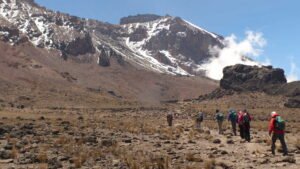
Mount Kilimanjaro beckons adventurers from around the world with its majestic presence as Africa tallest mountain. Standing at 19,341 feet (5,895 meters), this iconic peak offers one of the most accessible “big mountain” experiences on Earth. Before you lace up your hiking boots, though, you’re probably asking yourself an important question: just how long does it take to climb Mount Kilimanjaro?
The answer depends on several factors, yet most climbers need 5 to 9 days to reach Uhuru Peak, Kilimanjaro’s summit. Furthermore, your fitness level, chosen route, and acclimatization needs will determine where you fall within this range.
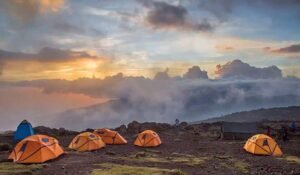
Your chosen route significantly impacts how many days you’ll spend on the mountain. Additionally, each of Kilimanjaro’s seven routes offers different timeframes:
Shorter Routes (5-6 days):
Longer Routes (7-9 days):
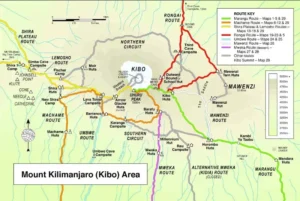
While you don’t need professional mountaineering skills, your fitness directly impacts how long does it take to climb mount kilimanjaro. Moreover, well-conditioned hikers maintain steadier paces and recover faster during rest days.
Fitness Requirements:
Your body needs time to adjust to Kilimanjaro’s high altitude. Unfortunately, rushing this process increases your risk of altitude sickness and summit failure.
Acclimatization Timeline:
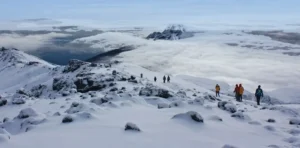
The Marangu route offers the shortest path to Kilimanjaro summit. Instead of camping, you’ll sleep in mountain huts, which makes it popular with first-time climbers.
Why Choose Marangu:
Challenges:
The Machame route balances challenge with success rates. Furthermore, this route takes you up the mountain’s western face, offering spectacular views.
Route Highlights:
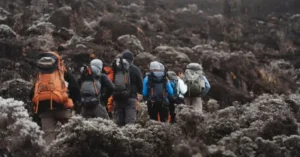
Many guides consider Lemosho the gold standard for Kilimanjaro climbs. Consequently, the extra day significantly improves your chances of reaching the summit.
Lemosho Advantages:
The Northern Circuit offers the longest and most comprehensive Kilimanjaro experience. In addition, this route circles the mountain’s northern slopes.
Best For:
Expect 4–6 hours of hiking each day as you move from lush rainforest to open moorland. Over this period, you’ll gain between 3,000 and 5,000 feet in elevation. The focus is on finding a steady pace, staying hydrated, and beginning the acclimatization process.
Daily hikes stretch to 5–7 hours while you navigate through the stark beauty of the alpine desert. Elevation increases more gradually here — about 2,000 to 3,000 feet. These days emphasize altitude awareness, maximizing rest, and prepping physically and mentally for the summit.
Summit day is the most demanding, often lasting 12–15 hours of trekking. You’ll ascend to 19,341 feet, crossing glacial and rocky terrain under cold, thin air. At this stage, mental resilience is key, along with prioritizing safety — and finally, celebrating your incredible achievement.
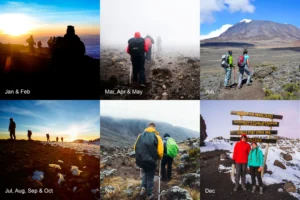
Kilimanjaro weather patterns directly impact climbing duration. Additionally, rain, snow, and extreme temperatures can slow your progress or force rest days.
Best Climbing Seasons:
Your climbing group’s pace affects everyone’s schedule. Similarly, stronger hikers must accommodate slower team members.
Group Considerations:
Smart climbers build flexibility into their schedules. Furthermore, weather delays, health issues, or equipment problems can extend your timeline.
Most climbers focus on reaching the summit, however, descent planning matters too. Coming down takes 2-3 days depending on your route.
Descent Timeline:
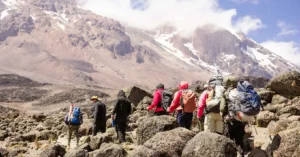
While most climbers need 5-9 days, speed records exist for context:
Important Note: Speed climbing requires extensive high-altitude experience and professional support. Therefore, average climbers should not attempt rapid ascents.
Understanding how long does it take to climb mount kilimanjaro includes preparation time. Your training timeline affects your climbing success as much as the climb itself.
3-6 Months Before:
1-2 Months Before:
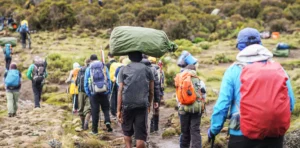
Five-day climbs work for experienced high-altitude hikers, yet we don’t recommend them for first-time Kilimanjaro climbers.
Consider 5 days if:
Most successful Kilimanjaro climbs fall into this range. As a result, you get adequate acclimatization without excessive time commitments.
Perfect for:
Longer climbs offer the highest summit success rates and most enjoyable experiences.
Choose longer climbs for:
Fitness helps, however, altitude acclimatization cannot be rushed. Additionally, your body needs time to adjust regardless of your fitness level. Even Olympic athletes must respect altitude timelines.
Six days represents the minimum for safe climbing with proper acclimatization. In contrast, five-day climbs carry higher risks of altitude sickness and summit failure.
No technical climbing skills are required, although extensive hiking experience helps enormously. Therefore, you should be comfortable hiking 6-8 hours daily with a loaded pack.
Higher altitudes require slower movement and more rest stops. Furthermore, your body processes oxygen less efficiently, making every step more demanding.
Yes, many operators offer flexible itineraries. However, maintain minimum acclimatization days for safety. Additionally, work with experienced guides to design optimal schedules.
How long does it take to climb Mount Kilimanjaro? For most climbers, 6-8 days provides the optimal balance of safety, success rates, and experience quality. Unfortunately, rushing the mountain rarely leads to summit success, while taking adequate time dramatically improves your chances.
Choose your route based on your experience level, available time, and desired challenge. Additionally, remember that reaching Kilimanjaro’s summit represents just one part of an incredible journey through Africa’s most diverse mountain ecosystem.
Start planning your training timeline 3-6 months before departure. Furthermore, the time you invest in preparation directly correlates with your climbing success and enjoyment.
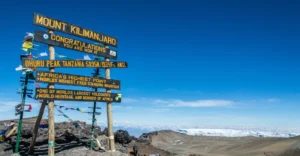
Ready to begin your Kilimanjaro adventure? Your journey to Africa’s rooftop awaits, and with proper planning, you’ll make those 6-8 days on the mountain truly unforgettable.
Planning your Kilimanjaro climb? Contact experienced operators who prioritize safety and success rates. Your summit dreams deserve professional support and realistic timelines.
We use cookies to personalise content and ads, to provide social media features and to analyse our traffic. We also share information about your use of our site with our social media, advertising and analytics partners who may combine it with other information that you’ve provided to them or that they’ve collected from your use of their services.
We also use cookies to collect data to personalize and measure the effectiveness of our ads. For more details, visit the Google Privacy Policy